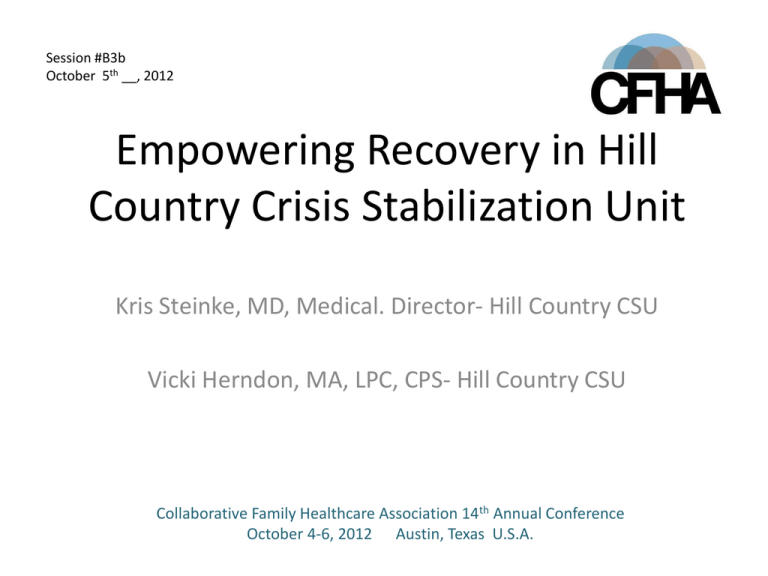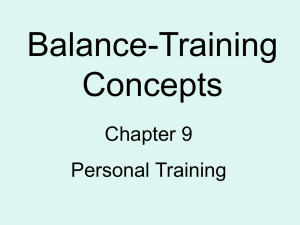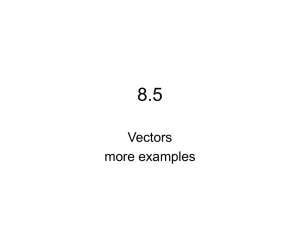Hill Country MHDD Centers - Collaborative Family Healthcare
advertisement

Session #B3b October 5th __, 2012 Empowering Recovery in Hill Country Crisis Stabilization Unit Kris Steinke, MD, Medical. Director- Hill Country CSU Vicki Herndon, MA, LPC, CPS- Hill Country CSU Collaborative Family Healthcare Association 14th Annual Conference October 4-6, 2012 Austin, Texas U.S.A. Disclosure Statement We have not had any relevant financial relationships with any of our references during the past 12 months. Any references to Curriculums and Products are for educational purposes only Hill Country MHDD Centers MISSION: Promoting Independence, Community Integration and Recovery Hill Country MHDD Centers Serves 19 counties 22,000 square miles Population base 560,000 Provides mental health, developmental disability, early childhood intervention, veteran, and substance abuse services Hill Country MHDD Centers Crisis Stabilization Unit Local state hospital moved to all forensic State remodeled vacant facility on state hospital campus to meet licensing requirements Hill Country MHDD Centers Crisis Stabilization Unit Provides up to 14 days inpatient care for individuals suffering from a mental health crisis primarily from 19 county service area One of 2 licensed Crisis Stabilization Units in rural setting in state of Texas Hill Country MHDD Centers Crisis Stabilization Unit Operational Funding through: Transfer of State Hospital Trust Funds Legislative Appropriation Competitive Award of Crisis Funds Total of $2,820,775 annually Hill Country MHDD Centers Crisis Stabilization Unit Additional Start Up Funding: Private Foundations and Local Businesses and Individuals donated $232,000 for furnishings and equipment County provided road to facility Hill Country MHDD Centers Center Crisis Stabilization Unit Opened May 15, 2009 Patients Served during 1st Year of Operation 434 Unique Patients 488 Admissions Average Stay 10 Days Occupancy Percentage 74% Hill Country MHDD Centers Crisis Stabilization Unit Staffing 2 Psychiatrists 5 Registered Nurses 3 Licensed Vocational Nurses 18 Direct Care Staff 2 Psychiatric Rehabilitation Staff 3 Mental Health Attendants 4 Support Staff Hill Country Community MHMR Center Crisis Stabilization Unit Primary Services Provided Medication Services Psychiatric Nursing Psychiatric Rehabilitation Social Work Peer Support Hill Country Community MHMR Center Crisis Stabilization Unit Discharge planning begins at admission Services geared to facilitate recovery and reduce recidivism Hill Country Community MHMR Center Crisis Stabilization Unit Studies show that medication doesn’t change molecular structure of brain – experiences do Dr. Eric Kandel (Nobel Prize Winner) New Intellectual Framework for Psychology Hill Country MHDD Centers Crisis Stabilization Unit When enter unit asked “Do you know why you are here and what do you want to accomplish?” Hill Country MHDD Centers Crisis Stabilization Unit Work on learning opportunities and experiences Reinforce experiences and behaviors Hill Country MHDD Centers Crisis Stabilization Unit Connect to local mental health clinic through telemedicine during staffing Build relationship for aftercare Hill Country MHDD Centers Crisis Stabilization Unit Focus on goal of individual Treat whole life to help people reach potential Therapy, art, yoga, exercise, etc. Hill Country MHDD Centers Crisis Stabilization Unit Psychiatric Rehabilitation Specialist Holds 1 group a day and meets individually with patients rest of day Mental Health Workers Hold 3 groups a day including a Relaxation & Sleepy Time Tea Group Hill Country MHDD Centers Crisis Stabilization Unit Utilize Peer Support(2 Groups per week) Peers help individuals relate experiences and let them know they are not alone Hear what never hear in clinic setting Clients gain desire to be Peer Facilitators Hill Country MHDD Centers Crisis Stabilization Unit Goals Reduction in Recidivism Inpatient & Outpatient Continuity of Care Consistent recovery based, holistic treatment philosophy Consistent and timely follow-up with patients in outpatient setting after discharge Empowerment Through Engagement We empower recovery through engagement. We take a partnership approach. We strive to use the following recovery principles in our engagement of individuals and staff; • Hope • Choice • Is trauma Informed. • Trust • Respect • Willingness • Accountability The Partnership Pie Concept Within Inpatient Crisis Setting % Contribution to Individual’s Recovery Process 20% 40 % 20 % 20 % Clinician Peers Providers Individual Empowerment through Group & Individual Services • We use two differing modes of psychiatric rehabilitation services; • Groups to introduce and educate individuals about our recovery approach. Topics covered in these sessions are structured tp facilitate the understanding of recovery. • Individual services are used to personalize treatment and build hope & trust. Group Sessions (5) Objectives • Help You Help You move beyond you current crisis and back into your life • Identify Personal Blocks to Recovery • Teach Symptom Identification/ Monitoring • Increase Self Esteem through Participation • Empower their decision to choose recovery as a way of life. ( paradigm shift; Victim-SurvivorThriver) Individual Sessions Objectives • Assess for impact of childhood trauma on sense of self and initiate supportive cognitive therapy/ coping skills • Assess for degree of ruminative thoughts and initiate supportive cognitive therapy/coping skills • Assess for degree of emotional pain (self report) and initiate supportive cognitive therapy/coping skills • Recommend seeking outpatient therapy to solidify gains. Operational Definition of Recovery “Recovery is a process of readjusting our attitudes, feelings, perceptions, and beliefs about ourselves, others, and life in general.” Within systems of care, recovery applies to both the individual and the service providers. L1) Individual Recovery Begin to see themselves as a person not a diagnosis. Start to develop hope and confidence in the value of their lives Begin to engage in trusting, supportive, and respectful interactions with others. They begin to take risk, make objective decisions and connect. Operational Definition Cont. • L2) Systemic Recovery • Transforms the concept of treatment from a hierarchical to a relational paradigm without minimizing the roles of the service providers. • It reduces stress because providers stop fixing patients and begin partnering with them. • It improves the work environment through respect and appreciations of every team members’ contribution, including the individual served. Approach To Services for Team • We function as a whole • Administration, crisis stabilization and out patient services are one organization. • We strive for Improvement • We not only attend trainings( ROCI) but we implement what we learn. • We empower recovery; one interaction at a time!!! Picture of Our Recovery Board Picture of Our Recovery Board Questions?? References • Spaniol, Koehler,& Hutchinson, (2009) The Recovery Workbook, Boston , University Center for Psychiatric Research. Boston University Press, MA. (p11) Session Evaluation Please complete and return the evaluation form to the classroom monitor before leaving this session. Thank you!








